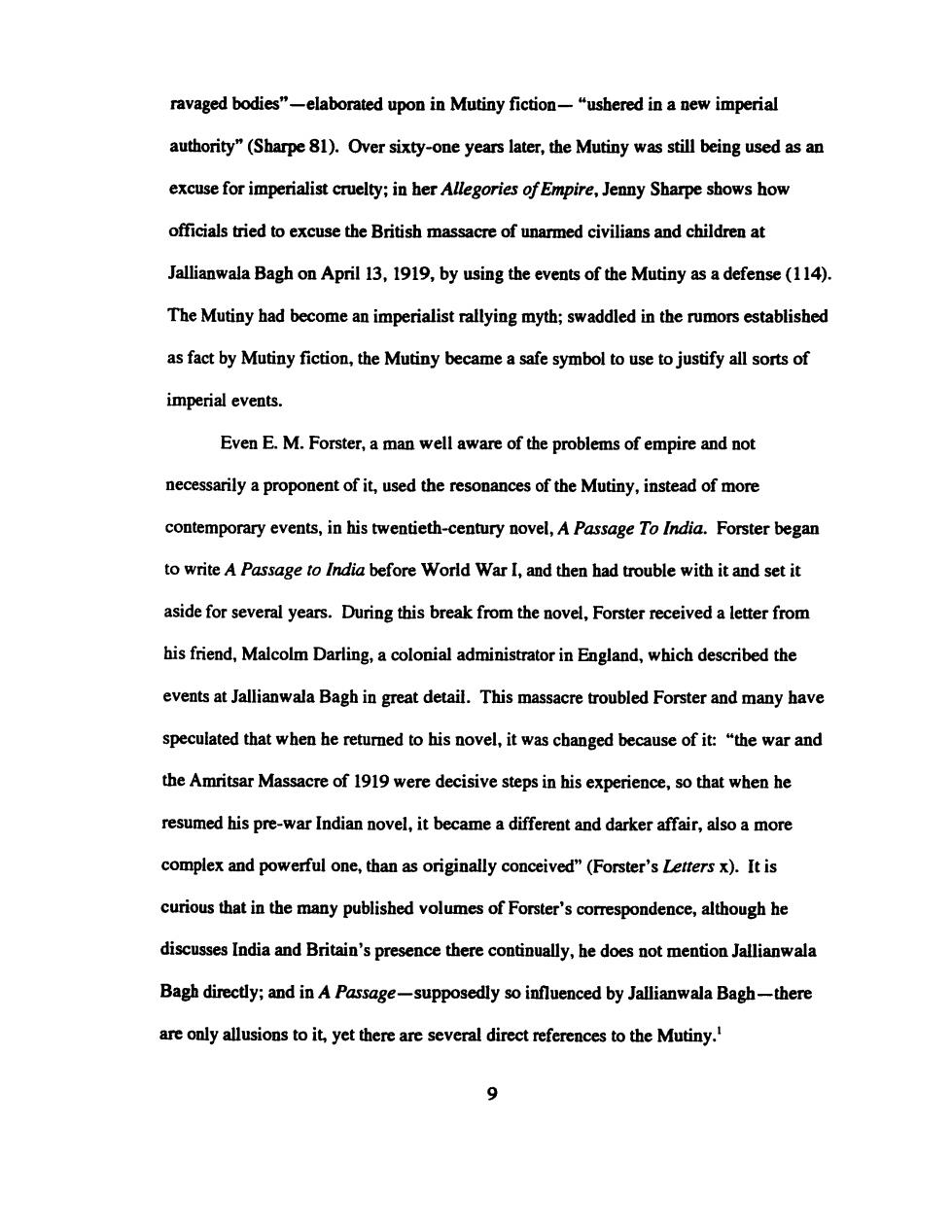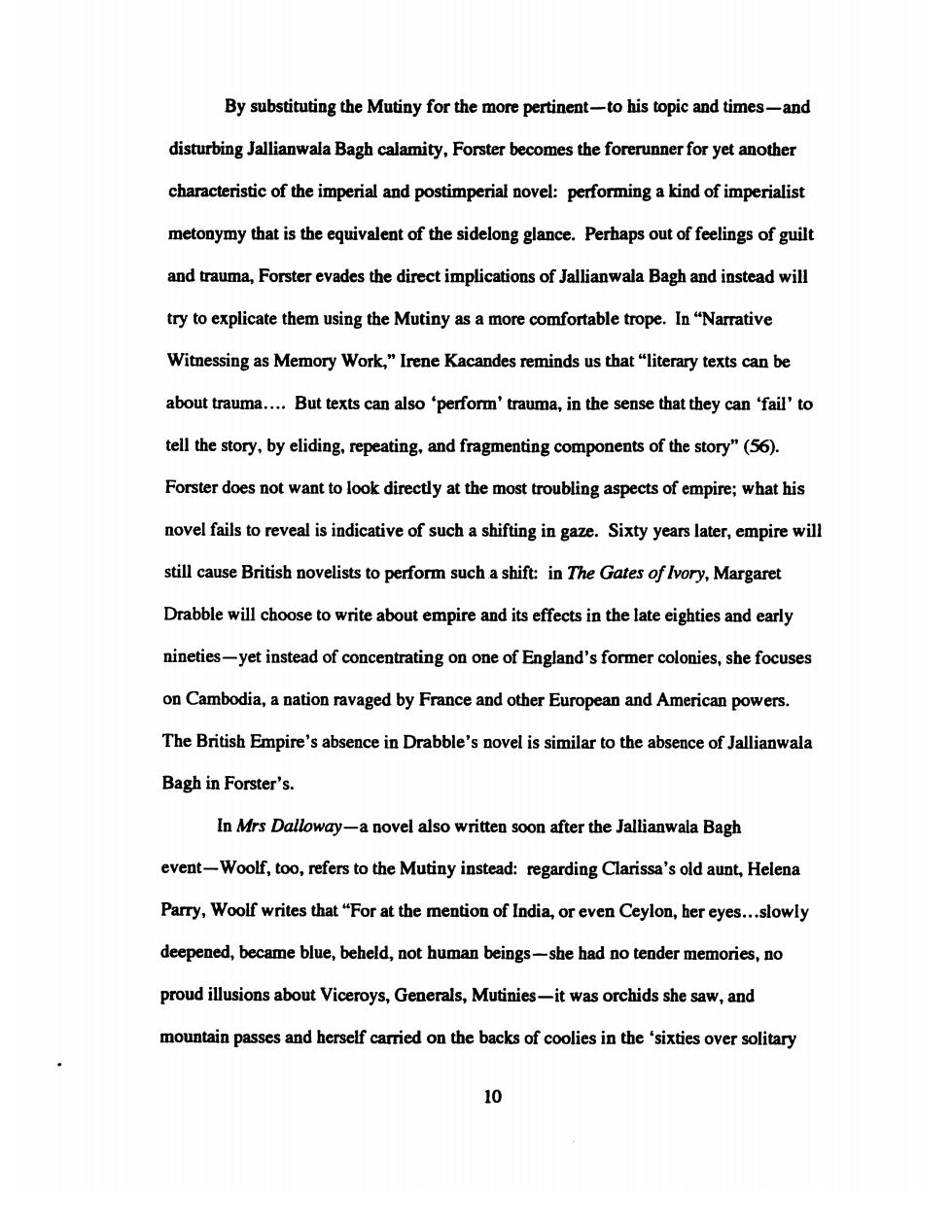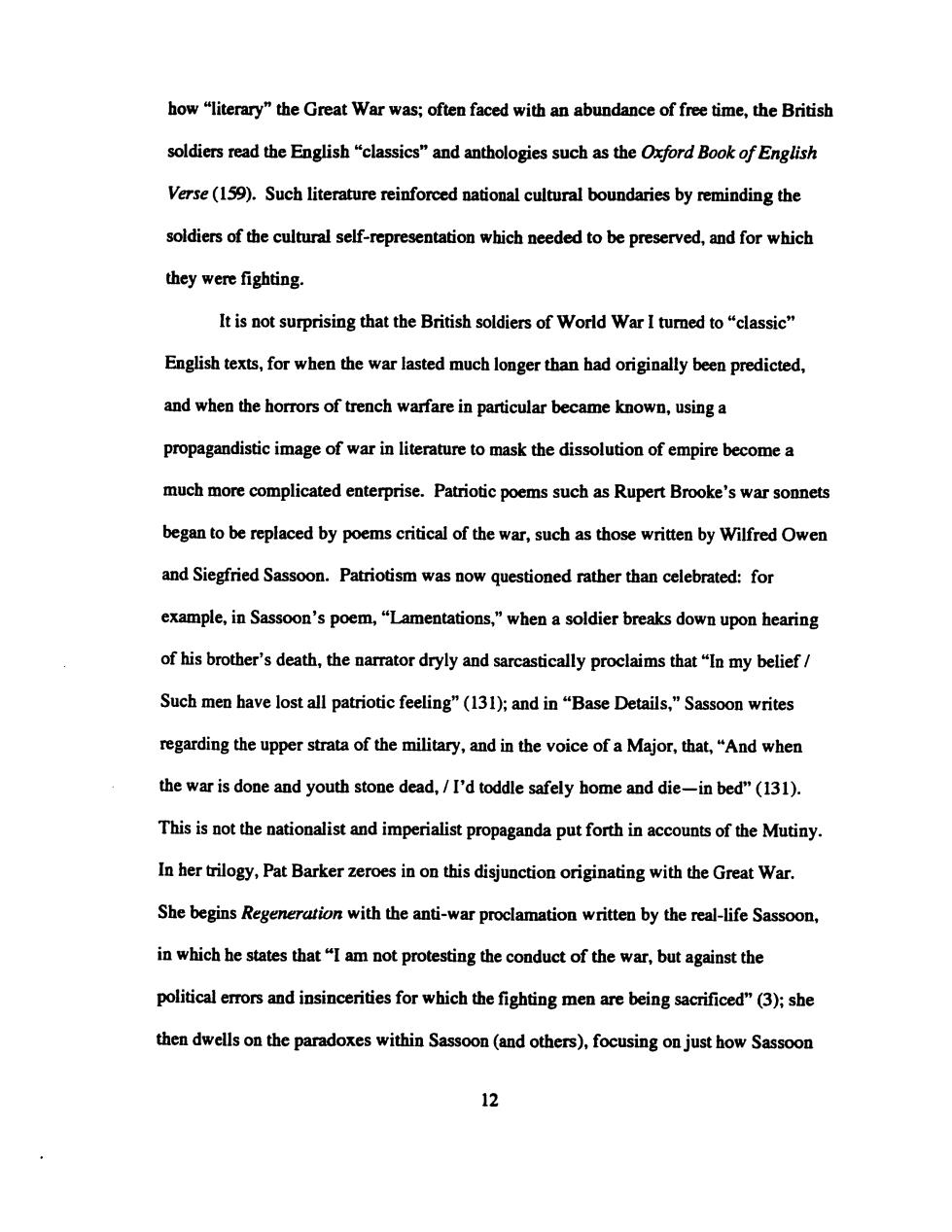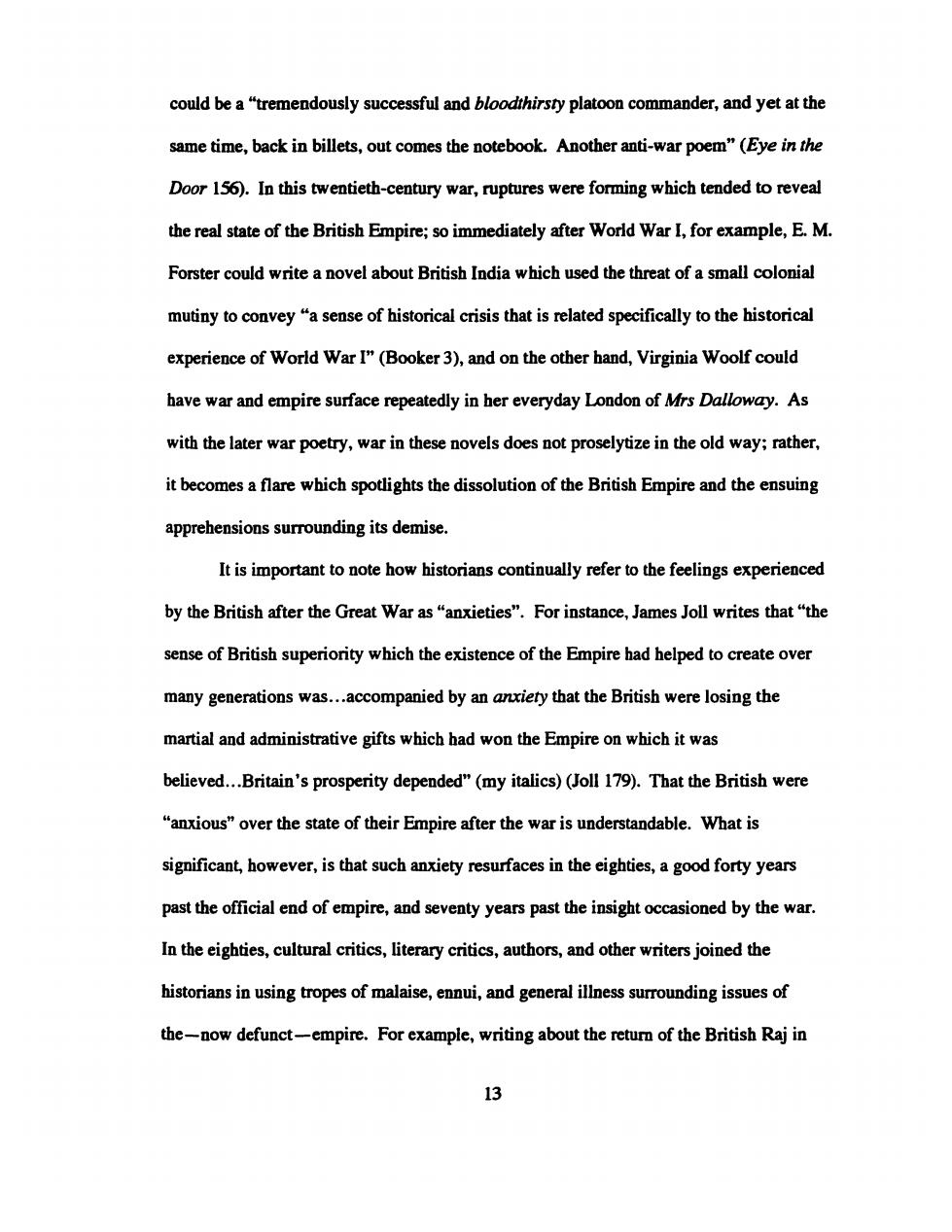
ravaged bodies"-elaborated upon in Mutiny fiction-"ushered in a new imperial authority"(Sharpe 81).Over sixty-one years later,the Mutiny was still being used as an excuse for imperialist cruelty;in her Allegories of Empire,Jenny Sharpe shows how officials tried to excuse the British massacre of unarmed civilians and children at Jallianwala Bagh on April 13,1919,by using the events of the Mutiny as a defense (114). The Mutiny had become an imperialist rallying myth;swaddled in the rumors established as fact by Mutiny fiction,the Mutiny became a safe symbol to use to justify all sorts of imperial events. Even E.M.Forster,a man well aware of the problems of empire and not necessarily a proponent of it,used the resonances of the Mutiny,instead of more contemporary events,in his twentieth-century novel,A Passage To India.Forster began to write A Passage to India before World War I,and then had trouble with it and set it aside for several years.During this break from the novel,Forster received a letter from his friend,Malcolm Darling,a colonial administrator in England,which described the events at Jallianwala Bagh in great detail.This massacre troubled Forster and many have speculated that when he returned to his novel,it was changed because of it:"the war and the Amritsar Massacre of 1919 were decisive steps in his experience,so that when he resumed his pre-war Indian novel,it became a different and darker affair,also a more complex and powerful one,than as originally conceived"(Forster's Letters x).It is curious that in the many published volumes of Forster's correspondence,although he discusses India and Britain's presence there continually,he does not mention Jallianwala Bagh directly;and in A Passage-supposedly so influenced by Jallianwala Bagh-there are only allusions to it,yet there are several direct references to the Mutiny.! 9

By substituting the Mutiny for the more pertinent-to his topic and times-and disturbing Jallianwala Bagh calamity,Forster becomes the forerunner for yet another characteristic of the imperial and postimperial novel:performing a kind of imperialist metonymy that is the equivalent of the sidelong glance.Perhaps out of feelings of guilt and trauma,Forster evades the direct implications of Jallianwala Bagh and instead will try to explicate them using the Mutiny as a more comfortable trope.In "Narrative Witnessing as Memory Work,"Irene Kacandes reminds us that"literary texts can be about trauma....But texts can also 'perform'trauma,in the sense that they can 'fail'to tell the story,by eliding,repeating,and fragmenting components of the story"(56). Forster does not want to look directly at the most troubling aspects of empire;what his novel fails to reveal is indicative of such a shifting in gaze.Sixty years later,empire will still cause British novelists to perform such a shift:in The Gates of lvory,Margaret Drabble will choose to write about empire and its effects in the late eighties and early nineties-yet instead of concentrating on one of England's former colonies,she focuses on Cambodia,a nation ravaged by France and other European and American powers. The British Empire's absence in Drabble's novel is similar to the absence of Jallianwala Bagh in Forster's. In Mrs Dalloway-a novel also written soon after the Jallianwala Bagh event-Woolf,too,refers to the Mutiny instead:regarding Clarissa's old aunt,Helena Parry,Woolf writes that "For at the mention of India,or even Ceylon,her eyes...slowly deepened,became blue,beheld,not human beings-she had no tender memories,no proud illusions about Viceroys,Generals,Mutinies-it was orchids she saw,and mountain passes and herself carried on the backs of coolies in the 'sixties over solitary 10

peaks"(271);Helena Parry is,interestingly,"an indomitable Englishwoman,fretful if disturbed by the War,say,which dropped a bomb at her very door,from her deep meditation over orchids and her own figure journeying in the'sixties in India"(271). The Mutiny does not disturb her,perhaps because it was made into successful propaganda;the war,on the other hand,can interrupt her reverie.In the twentieth century,novelists were still referring to the Mutiny-instead of more current imperial events-since it was yet a"safe"code event synonymous with the propaganda version of the British presence in India. When World War I began,it appeared initially as if it might serve as a modern version of the Mutiny and function similarly in literature.And at first this seemed to work:the war was going to.be another event that reinforced the image of the British Empire,a moment around which could coalesce the motivating feelings of nationalism and patriotism.The initial literature written about the war-such as Rupert Brooke's famous "If I should die,think only this of me:That there's some comer of a foreign field/That is for ever England"sonnet-did act as an extension of Mutiny propaganda War literature was to serve as a kind of cultural self-representation in the same way as Mutiny literature did.It was retro in function and in style;in The Ruling Passion, Christopher Lane points out how the war poets,for example,were(and still are)popular in that they allowed the reader to escape the contemporary issues confronting them in modemist works.Lane suggests that the war poets'popularity had jingoistic origins and that such impulses"may explain why the war poets remain so enduringly popular,and why their aesthetic seems central to Britain's disavowal of its imperial dissolution and economic turbulence at the war's end"(196).Paul Fussell has written extensively on 11

how "literary"the Great War was;often faced with an abundance of free time,the British soldiers read the English "classics"and anthologies such as the Oxford Book of English Verse(159).Such literature reinforced national cultural boundaries by reminding the soldiers of the cultural self-representation which needed to be preserved,and for which they were fighting. It is not surprising that the British soldiers of World War I turned to "classic" English texts,for when the war lasted much longer than had originally been predicted, and when the horrors of trench warfare in particular became known,using a propagandistic image of war in literature to mask the dissolution of empire become a much more complicated enterprise.Patriotic poems such as Rupert Brooke's war sonnets began to be replaced by poems critical of the war,such as those written by Wilfred Owen and Siegfried Sassoon.Patriotism was now questioned rather than celebrated:for example,in Sassoon's poem,"Lamentations,"when a soldier breaks down upon hearing of his brother's death,the narrator dryly and sarcastically proclaims that"In my belief/ Such men have lost all patriotic feeling"(131);and in "Base Details,"Sassoon writes regarding the upper strata of the military,and in the voice of a Major,that,"And when the war is done and youth stone dead,/I'd toddle safely home and die-in bed"(131). This is not the nationalist and imperialist propaganda put forth in accounts of the Mutiny. In her trilogy,Pat Barker zeroes in on this disjunction originating with the Great War. She begins Regeneration with the anti-war proclamation written by the real-life Sassoon, in which he states that"I am not protesting the conduct of the war,but against the political errors and insincerities for which the fighting men are being sacrificed"(3);she then dwells on the paradoxes within Sassoon(and others),focusing on just how Sassoon 12

could be a "tremendously successful and bloodthirsty platoon commander,and yet at the same time,back in billets,out comes the notebook.Another anti-war poem"(Eye in the Door 156).In this twentieth-century war,ruptures were forming which tended to reveal the real state of the British Empire;so immediately after World War I,for example,E.M Forster could write a novel about British India which used the threat of a small colonial mutiny to convey "a sense of historical crisis that is related specifically to the historical experience of World War I"(Booker 3),and on the other hand,Virginia Woolf could have war and empire surface repeatedly in her everyday London of Mrs Dalloway.As with the later war poetry,war in these novels does not proselytize in the old way;rather, it becomes a flare which spotlights the dissolution of the British Empire and the ensuing apprehensions surrounding its demise. It is important to note how historians continually refer to the feelings experienced by the British after the Great War as"anxieties".For instance,James Joll writes that "the sense of British superiority which the existence of the Empire had helped to create over many generations was...accompanied by an anxiety that the British were losing the martial and administrative gifts which had won the Empire on which it was believed...Britain's prosperity depended"(my italics)(Joll 179).That the British were "anxious"over the state of their Empire after the war is understandable.What is significant,however,is that such anxiety resurfaces in the eighties,a good forty years past the official end of empire,and seventy years past the insight occasioned by the war. In the eighties,cultural critics,literary critics,authors,and other writers joined the historians in using tropes of malaise,ennui,and general illness surrounding issues of the-now defunct-empire.For example,writing about the return of the British Raj in 13